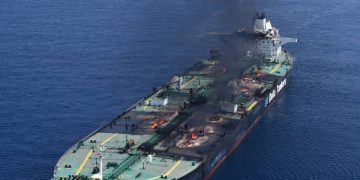Gulf of Mexico disaster a reminder of what can go wrong offshore
The number of potentially catastrophic gas releases on North Sea installations has fallen significantly – a year after the UK government’s safety watchdog ordered the industry to “up its game” in countering the threat of leaks offshore.

Twelve months ago the Health and Safety Executive (HSE) issued a wake-up call to the oil giants to get their houses in order following revelations that the number of “major and significant” releases of gas and oil had increased by a third to its highest level since 2003. But yesterday it praised the industry for taking a “step in the right direction” after a new report showed the number of releases had fallen to 73 from 85 the previous year.
The new offshore safety statistics show that the total number of “dangerous occurrences” – including hydrocarbon releases, adverse weather damage and equipment failure – had also fallen.
For the fourth year running, no workers were killed during offshore activities and the past year also saw a fall in the number of major injuries, with 42 reported compared with 50 the previous year.
Steve Walker, HSE’s head of offshore safety, said: “This year’s statistics are a step in the right direction. It is encouraging that this is the fourth consecutive year with no reportable fatalities and a reduction in major injuries.
“There is still much work to be done. Hydrocarbon releases are a key indicator of how well the offshore industry is managing its major accident risks, and the industry still hasn’t matched or exceeded the record lows of two years ago.”
He added: “The Gulf of Mexico disaster should continue to be a stark reminder of what can go wrong offshore.
“HSE will remain tough on companies that fail to protect their workforce by not investing in the fabric and workings of their installations or neglecting to implement effective management systems or workforce training.”
Robert Paterson, the health and safety director with Oil and Gas UK, the pan-industry trade body, welcomed the report.
He said the statistics reflected the “significant effort” the industry had made to get back on track after last year’s disappointing performance.
He said: “The reduction in the number of hydrocarbon releases is a move in the right direction as this remains a top priority and a key focus of the industry’s absolute commitment to continuously improving process safety standards.
“While we acknowledge we’ve made progress compared with last year, there are still areas for us to improve upon.”
The HSE report stated: “A total of 432 dangerous occurrences were reported, 11 fewer than the previous year. The main types of dangerous occurrences reported were hydrocarbon releases (38.9 per cent), dropped objects, adverse weather damage and failure of equipment required to maintain installation position offshore, well-related incidents and lifting operations.”
An HSE spokesman added: “One fatality occurred in 2010-11 when a worker collapsed during a working shift. The incident was not caused by a work accident so is not included as a fatality statistic. An investigation is ongoing.”
Source: Scotsman


































































